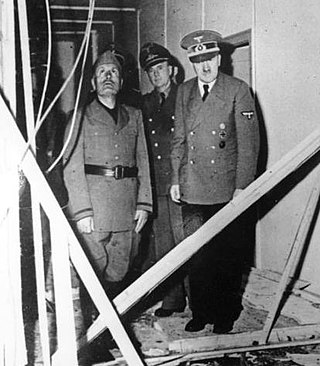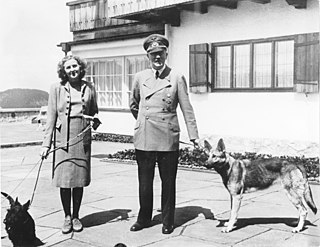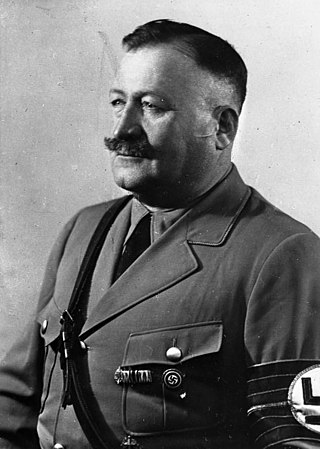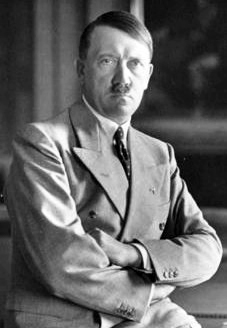
Angela Maria "Geli" Raubal was an Austrian woman who was the half-niece of Adolf Hitler. Born in Linz, Austria-Hungary, she was the second child and eldest daughter of Leo Raubal Sr. and Hitler's half-sister, Angela Raubal. Raubal lived in close contact with her half-uncle Adolf from 1925 until her presumed suicide in 1931.

Edgar Julius Jung was a German lawyer born in Ludwigshafen in the Kingdom of Bavaria. He was a leader of the conservative revolutionary movement in Germany which stood not only in opposition to the Weimar Republic, whose parliamentarian system he considered decadent and foreign-imposed, but also opposed National Socialism. Jung was murdered in the 1934 Night of the Long Knives purge.

Sir Ian Kershaw is an English historian whose work has chiefly focused on the social history of 20th-century Germany. He is regarded by many as one of the world's foremost experts on Adolf Hitler and Nazi Germany, and is particularly noted for his biographies of Hitler.

The health of Adolf Hitler, dictator of Germany from 1933 to 1945, has long been a subject of popular controversy. Both his physical and mental health have come under scrutiny.

Sir Richard John Evans is a British historian of 19th- and 20th-century Europe with a focus on Germany. He is the author of eighteen books, including his three-volume The Third Reich Trilogy (2003–2008). Evans was Regius Professor of History at the University of Cambridge from 2008 until his retirement in 2014, and President of Cambridge's Wolfson College from 2010 to 2017. He has been Provost of Gresham College in London since 2014. Evans was appointed Knight Bachelor for services to scholarship in the 2012 Birthday Honours.
The functionalism–intentionalism debate is a historiographical debate about the reasons for the Holocaust as well as most aspects of the Third Reich, such as foreign policy. It essentially centres on two questions:
The religious beliefs of Adolf Hitler, dictator of Nazi Germany from 1933 to 1945, have been a matter of debate. His opinions regarding religious matters changed considerably over time. During the beginning of his political life, Hitler publicly expressed favorable opinions towards traditional Christian ideals, but later totally rejected them. Most historians describe his later posture as adversarial to organized Christianity and established Christian denominations. He also criticized atheism.

The Goebbels Diaries are a collection of writings by Joseph Goebbels, a leading member of the National Socialist German Workers Party (NSDAP) and the Reich Minister of Public Enlightenment and Propaganda in Adolf Hitler's government from 1933 to 1945. The diaries, which have only recently been published in full in German and are available only in part in English, are a major source for the inner history of the Nazi Party and of its twelve years in power in Germany. The British historian Ian Kershaw wrote in the preface to his biography of Hitler: "For all the caution which must naturally be attached to Goebbels's regularly reported remarks by Hitler ... the immediacy as well as the frequency of the comments makes them a vitally important source of insight into Hitler's thinking and action."

"Hitler's Table Talk" is the title given to a series of World War II monologues delivered by Adolf Hitler, which were transcribed from 1941 to 1944. Hitler's remarks were recorded by Heinrich Heim, Henry Picker, Hans Müller and Martin Bormann and later published by different editors under different titles in four languages. Henry Picker, Hitlers Tischgespräche , Deutsche Nationalbibliothek, https://ia803406.us.archive.org/35/items/hitlers-tischgespraeche/hitlers_tischgespraeche.pdf

The sexuality of Adolf Hitler, dictator of Germany from 1933 to 1945, has long been a matter of historical and scholarly debate, as well as speculation and rumour. There is evidence that he had relationships with a number of women during his lifetime, as well as evidence of his antipathy to homosexuality, and no evidence of homosexual encounters. His name has been linked to a number of possible female lovers, two of whom committed suicide. A third died of complications eight years after a suicide attempt, and a fourth also attempted suicide.
The Hitler family comprises the relatives and ancestors of Adolf Hitler, an Austrian-born German politician and the leader of the Nazi Party, who was the dictator of Germany, holding the title Chancellor of Germany from 1933 to 1945, and head of state as Führer und Reichskanzler from 1934 to 1945. Adolf Hitler had a central role in the rise of Nazism in Germany, provoking the start of World War II, and holding ultimate responsibility for the deaths of many millions of people during the Holocaust.
Gerhard Herbert Kretschmar was a German child born with severe disabilities. After receiving a petition from the child's parents, the German Führer Adolf Hitler authorized one of his personal physicians, Karl Brandt, to have the child euthanized. This marked the beginning of the program in Nazi Germany known as a "euthanasia program" – Aktion T4 – which ultimately resulted in the murder of about 200,000 people with mental and/or physical disabilities.

The possibility that Adolf Hitler had only one testicle has been a fringe subject among historians and academics researching the Nazi leader. The rumour may be an urban myth, possibly originating from the contemporary British military song "Hitler Has Only Got One Ball".
Werner Willikens was a German politician with the Nazi Party who largely served in agricultural administration. He was also a general officer in the SS. His phrase "working towards the Führer", which he used in a 1934 speech, has become a common description of Nazi bureaucracy.

Christian Weber was a German Nazi Party (NSDAP) official and member of the Schutzstaffel (SS).
Beefsteak Nazi or "Roast-beef Nazi" was a term used in Nazi Germany to describe communists and socialists who joined the Nazi Party. Munich-born American historian Konrad Heiden was one of the first to document this phenomenon in his 1936 book Hitler: A Biography, remarking that in the Sturmabteilung ranks there were "large numbers of Communists and Social Democrats" and that "many of the storm troops were called 'beefsteaks' – brown outside and red within". The switching of political parties was at times so common that SA men would jest that "[i]n our storm troop there are three Nazis, but we shall soon have spewed them out".

Hitler: A Study in Tyranny is a 1952 biography of the Nazi dictator Adolf Hitler by British historian Alan Bullock. It was the first comprehensive biography of Hitler. A revised version was published in 1962.

The historiography of Adolf Hitler deals with the academic studies of Adolf Hitler from the 1930s to the present. In 1998, a German editor said there were 120,000 studies of Hitler and Nazi Germany. Since then many more have appeared, with many of them decisively shaping the historiography regarding Hitler..
Anton Joachimsthaler is a German historian. He is particularly noted for his research on the early life of the German dictator Adolf Hitler, in his book Korrektur einer Biografie and his last days in the book Hitlers Ende, published in English as The Last Days of Hitler.











